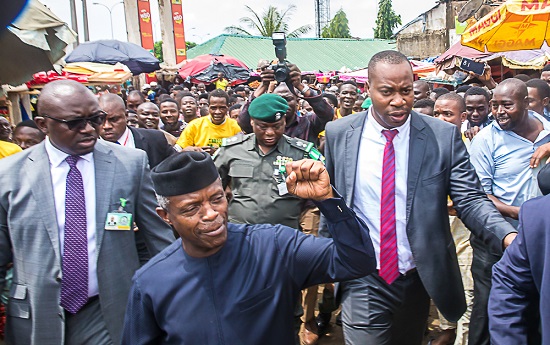This post has already been read 1342 times!
Vice President Yemi Osinbajo has disclosed that the Islamist terror group, Boko Haram, has killed 20,000 persons and destroyed infrastructure worth $9 billion in 10 years.
Osinbajo said this yesterday at the inauguration of an intervention initiative tagged ‘Inclusive Basic Service Delivery and Livelihood Empowerment Integrated Programme’ by the African Development Bank in Abuja. The vice president said the war on insurgency had displaced more than two million Nigerians from their homes and communities.
He said, “there is no doubt that the havoc that the Boko Haram insurgency has wreaked on the North-East Nigeria and the entire country is unprecedented in recent Nigeria’s history.
“Over the last decade, more than 20,000 persons have been killed and $9bn infrastructure destroyed, including more than 400,000 houses and thousands of schools, hospitals and other public buildings. And more than two million Nigerians have been displaced from their homes and communities.
“But the devastation is only a part of the narrative; it is definitely not the entire story. There are the countless stories of heroism and resilience, from the victims of the insurgency, from the troops of the Nigerian Army and the Civilian Joint Task Force, all of who are out there fighting and sacrificing a great deal to keep us safe.
“For me, these stories of resilience and hope and optimism deserve a lot more attention than they are currently getting.”
Osinbajo noted that the rate of killings in the region had reduced from the peak witnessed in 2014 by 83 per cent.
He said, “This year alone, the Nigerian Army’s Operation Last Hold has helped 35,000 people voluntarily return to their homes and communities and commence the task of rebuilding lives and livelihoods.
“This is not to say there are still no challenges or that we are satisfied with where we are. Certainly not; indeed, if there were no challenges left, we would not be here today to launch the IBSIP.
“In 2016, we unveiled the Buhari Plan, a comprehensive blueprint for the recovery and reconstruction of the region. The plan established the Presidential Committee on the North-East Initiative to coordinate all efforts by state and non-state actors, domestic and international, to comprehensively address the economic, social and humanitarian crises in the region.”
“At the core of our efforts is the conviction that humanitarian interventions are not by themselves enough to bring about a radical transformation of the circumstances of the North East region”.



